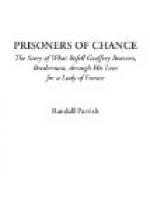“I give thee peace of Holy Church, my son,” I muttered solemnly, leaning heavily against the jamb of the door, uplifting my hand in benediction. “May the presence of the Mother and Child guard thee in time of battle.”
The face of the young soldier grew sober, and he withdrew one hand from its grasp on the shining musket piously to make the sign of the cross.
“I thank thee, padre, for thy blessing,” he returned gratefully. “It will be in accord with the prayers of those I left at home in Spain.”
Whether or not guards on duty in the corridor had orders to pass the father unquestioned, this lad, at least, made no effort to prevent my inserting the great iron key within the lock of the door. Doubtless my possession of it was accepted as evidence of my right to its use; anyway he remained there in that same careless posture, a pleased smile on his face, watching me curiously. The heavy nail-studded door swung noiselessly ajar; with single questioning glance backward at the motionless sentry, I stepped within, closed it behind me, and stood, my heart throbbing fiercely, face to face with her husband—the man to whom had been given the woman I loved,—Chevalier Charles de Noyan, condemned to die at sunrise.
CHAPTER VII
THE CHEVALIER DE NOYAN
It seems strange any man should deliberately venture life for one he had never seen; one whom, moreover, he hated with an intensity of passion seldom experienced between man and man. I have not been of revengeful disposition, nor often indulged in grave personal dislike, yet it would be wrong in this simple narrative for me to attempt concealment of my own impulses. So it is impossible to deny that, from the first moment when she called Charles de Noyan husband, I felt toward him a degree of animosity deeper than I had before supposed it possible for me to entertain relative to any human being. It was bitter memory of the past, a belief that I had once won the heart of this fair girl, only to be balked of reward by spectral hands of religion, which swayed me thus strongly. To my thought this stranger was one who had purchased, from priests at the altar, what was mine by divine decree; what would remain mine forever from the mandate of love unchangeable, eternally sealed by higher power than any priestly ritual.
Yet I had already passed through a day and night of intense excitement, of grave peril, endeavoring to preserve the life of this man whom I would more gladly see die than any one I ever knew. I stood now in the open jaws of my own destruction, where the slightest false movement, or ill-judged word, upon his part or my own, must mean betrayal; where an awakening of suspicion in the simple mind of the sentry without, or of his captain in the corridor; the return to consciousness, or chance discovery, of the bound priest upon the upper deck, would ruin every hope, sentencing me to a fate no less speedy or certain than that which now awaited him I sought to serve. All this had I risked that I might aid in the escape of the one and only man in all the wide world who stood between me and the woman I loved.




